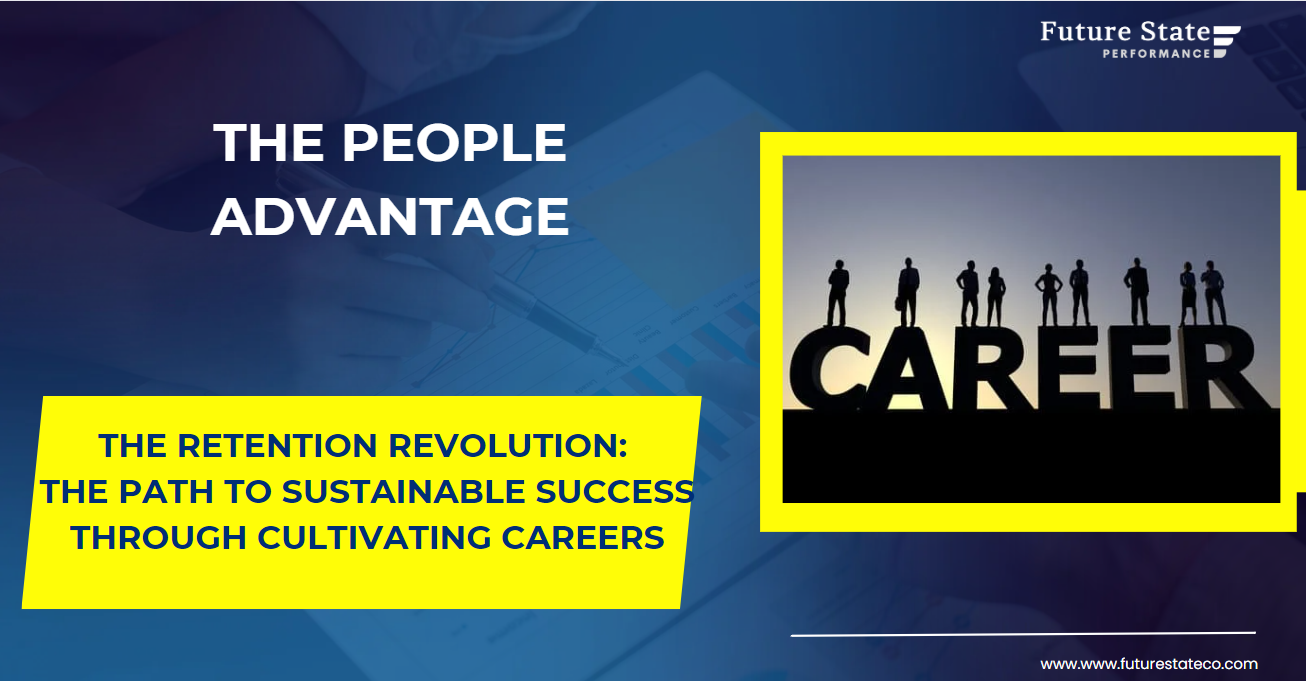Personal Development
The Retention Revolution: The path to sustainable success through Cultivating Careers
By Shay Lynch
May 18, 2024
Summary
Neglecting career development within your organisation can have significant repercussions, including disengagement and the loss of top talent. However, by prioritising career development initiatives, you can foster employee engagement, retention, and overall organisational success. Key components of effective career development include succession planning, promotion pathways, internal mobility opportunities, leadership development programmes, performance and fulfilment reviews, and support for both soft and hard skills development. By investing in these areas, you empower your team to grow, excel, and contribute meaningfully to the company's objectives.
Introduction
In today’s competitive business landscape, neglecting the career development of your team members can have profound consequences. Without clear pathways for growth and advancement, employees may become disengaged, leading to decreased productivity, morale, and retention rates. Moreover, failing to nurture and develop top talent puts organisations at risk of losing key contributors to competitors, resulting in a loss of institutional knowledge and competitive edge, or even worse, leaving and staying, that is stay, but cut back on contribution.
To give your business the best chance of developing and retaining top talent, there are some crucial considerations:
Succession Planning:
Succession planning is critical for organisations to identify and prepare future leaders who can seamlessly step into key roles as current leaders transition or move on. By proactively identifying and developing internal talent, organisations can ensure continuity in leadership, maintain institutional knowledge, and mitigate the risks associated with unexpected vacancies.
Promotion Development:
Promotion development involves establishing clear criteria and pathways for advancement within the organisation. By providing transparent guidelines for career progression and offering opportunities for skill development and advancement, organisations can empower employees to take ownership of their career growth and increase retention by recognising and rewarding top performers.
Career Journey Planning:
Career journey planning focuses on creating personalised development plans for employees to align their career aspirations with the strategic objectives of the organisation. By fostering open and ongoing conversations about career goals and aspirations, organisations can support employees in navigating their career paths and maximising their potential within the company.
Internal Mobility:
Internal mobility programmes enable employees to explore different roles and departments within the organisation, facilitating skill development, career growth, and adaptability. By encouraging employees to pursue new opportunities and experiences internally, organisations can retain top talent, foster a culture of continuous learning, and increase employee engagement and satisfaction.
Leadership Development:
Leadership development initiatives are essential for identifying and nurturing emerging leaders and equipping them with the skills and competencies needed to succeed in future leadership roles. By investing in leadership development programmes, organisations can cultivate a pipeline of effective leaders, drive innovation and strategic growth, and build a sustainable leadership culture.
Performance & Fulfilment Reviews:
Regular performance and fulfilment reviews provide employees with valuable feedback on their performance, contribution, and career progression. By recognising and rewarding achievements, addressing areas for improvement, and aligning individual goals with organisational objectives, organisations can enhance employee motivation, engagement, and job satisfaction.
Soft Skills Development:
Soft skills development focuses on enhancing essential interpersonal skills such as communication, teamwork, and problem-solving. By providing training and development opportunities to strengthen employees’ soft skills, organisations can improve collaboration, leadership effectiveness, and overall team performance.
Hard Skills Development:
Hard skills development involves providing employees with the technical competencies and expertise necessary to excel in their roles. By offering training, certifications, and learning opportunities tailored to employees’ specific job functions, organisations can ensure that their workforce remains skilled, competent, and adaptable to evolving industry trends and technologies.
Support for Personal Brand Development:
Supporting employees in building their personal brands enhances their visibility, credibility, and professional reputation both within the organisation and the industry. By providing resources, guidance, and opportunities for personal branding initiatives, organisations can empower employees to showcase their expertise, attract new opportunities, and contribute positively to the company’s brand image.
Mentoring & Coaching:
Mentoring and coaching programmes provide employees with valuable guidance, support, and feedback for career growth and development. By pairing employees with experienced mentors or coaches, organisations can facilitate knowledge transfer, skill development, and career advancement, fostering a culture of continuous learning and professional growth.
In Conclusion:
In the business landscape we operate in today, the importance of nurturing and developing talent cannot be overstated. As highlighted, failing to invest in career development can lead to disengagement and talent attrition, hindering organizational progress. However, by implementing robust career development initiatives, you can create a culture of growth, empowerment, and continuous learning within your team. By providing clear pathways for advancement, fostering leadership capabilities, and offering ongoing support for skills enhancement, you not only retain top talent but also cultivate a workforce that is motivated, fulfilled, and equipped to drive business success. Embrace the power of career development as a strategic imperative, and watch as your organization thrives in today’s competitive landscape.



